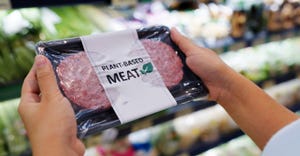Outbreaks of coronavirus, the White House acknowledged, have affected large meat processors and their workers, with potentially severe consequences for the nation’s food supply.
.png?width=850&auto=webp&quality=95&format=jpg&disable=upscale)
President Donald Trump on April 29 announced measures to ensure Americans have continued access to beef, pork and poultry amid a pandemic that has sickened food workers and led to a shutdown of several plants across the nation.
Trump’s executive order directs USDA to ensure, to the maximum extent possible, that meat and poultry processors continue operations without interruptions.
Responding to the announcement, Agriculture Secretary Sonny Purdue said his agency will work with meat processing firms to verify they are operating in accordance with guidance from the Centers for Disease Control and Prevention (CDC) and Occupational Safety and Health Administration (OSHA).
The guidance recommends certain actions so employers can reduce the risk of exposure to the coronavirus, which has already led to more than 60,000 deaths in the United States. Those measures, the North American Meat Institute said, include such things as temperature checks, face coverings, testing and social distancing when possible.
Commenting on the executive order, Mike Brown, president of the National Chicken Council, a trade group representing the chicken industry, reported his industry is following federal guidelines. He also said many companies have consulted with infection disease doctors to craft site plans. However, Brown maintained localities and states are not uniformly enforcing CDC guidelines in plants.
“This patchwork approach is posing grave risk to the supply chain and threatening great disruption to NCC member companies,” Brown said in a statement. “There must be a uniform approach across all states and we are hopeful that today’s announcement is a good first step in achieving that goal.”
Outbreaks of coronavirus, the White House acknowledged, have affected large meat processors and their workers, with potentially severe consequences for the nation’s food supply.
“Closure of a single large beef processing plant can result in the loss of over 10 million servings of beef in a single day,” according to a White House fact sheet related to Trump’s executive order. “Similarly, the closure of a single plant can eliminate more than 80% of the supply of a particular meat product—like ground beef—to an entire grocery store chain.”
Marc Perrone, the president of the United Food and Commercial Workers International Union (UFCW), said during an April 23 call with reporters that his organization had documented 13 deaths and more than 5,000 workers who had fallen ill or been exposed to the virus. Thirteen plants with workers represented by the union have shut down at some point during the pandemic, affecting 24,500 employees, he added.
“Unless immediate changes are made, America’s food processing and meat packing workers are in danger, and so is America’s food supply,” Perrone said.
He called for additional measures to better protect workers, including more testing, essential access to personal protective equipment and mandated social distancing, among other actions. But given the nature of the work at meat production plants, some measures are difficult, if not impossible, to implement.
“At my workplace, people are working shoulder to shoulder,” Achut Deng, a worker at the Smithfield Foods pork plant in Sioux Falls, South Dakota, said during the call hosted by UFCW.
Deng is among the more than 1 million Americans who have tested positive for COVID-19. She also passed on the virus to one of her three children.
“It was very scary,” Deng said.
On April 12, Smithfield announced that its plant in Sioux Falls—one of the largest U.S. pork processing facilities supplying nearly 130 million servings of food per week—would remain closed until further notice. The company also has closed plants in other locations.
“The closure of this facility, combined with a growing list of other protein plants that have shuttered across our industry, is pushing our country perilously close to the edge in terms of our meat supply,” Kenneth Sullivan, president and CEO of Smithfield, said in a statement at the time of the announcement.
Plant closures in several states and Alberta, Canada represent about 10% of all beef production and 25% of pork production in the United States, according to Mark Lauritsen, a UFCW official.
“The coronavirus poses an unprecedented threat and challenge to the workers across this industry,” he said during the call with journalists. “Never in my 30 years of experience have workers faced anywhere close to the risks that they’re currently facing in the plants across this country.”
About the Author(s)
You May Also Like






